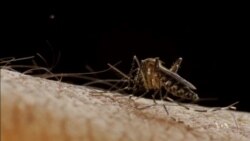A Zika virus outbreak has been exploding in South and Central America and the Caribbean, but experts say that except for the possible link with microcephaly, the epidemic probably would have gone largely unnoticed.
It is that suspected connection with microcephaly — a condition in which babies are born with abnormally small heads and underdeveloped brains — that is causing alarm.
"We don't know the degree of the connection, whether it's truly causal, whether there's Zika plus something else resulting in the microcephaly, whether it's Zika interacting with something else or if it has nothing at all to do with Zika,” said Dr. Anthony Fauci, who heads the National Institute of Allergy and Infectious Diseases at the National Institutes of Health. “We don't know for sure, but the evidence of the association is rather strong."
Still, he pointed out that Colombia has had a large outbreak of Zika, but no association with microcephaly.
WATCH: Massive Zika Outbreak in US Unlikely
Eighty percent of the people who get Zika don't know they have it. The other 20 percent get a mild fever, mild rash and conjunctivitis, or pink eye. The virus goes away in a few days.
‘Perfect storm’ in Americas
Zika is named after the Zika forest of Uganda where it was first identified decades ago. The virus then migrated to Southeast Asia, before hopping across the Pacific and making its way to Brazil.
Zika was new to the Americas. People there had never been exposed to it and had no immunity. But the type of mosquito that carries Zika thrives in Brazil's crowded cities.
This mosquito lives in water cisterns, can breed in tiny amounts of water, bites during the day and likes to live indoors.
"So you had the perfect storm: a naive population to the particular infection, a real problem with the mosquito and mosquito-transmitted diseases," said Fauci.
Zika has spread to some 24 countries in Latin America and the Caribbean.
There have been cases in the U.S., and health experts, including Fauci, expect to see small outbreaks of Zika in Florida, Texas and along the Gulf of Mexico.
But experts don't expect to see massive outbreaks in the U.S. because Americans' exposure to mosquitoes is limited through the use of air conditioning and window screens.
Education key
The goal right now is to educate pregnant women, and those who may become pregnant, about the possibility of birth defects so they can cover up to limit mosquito bites and use an insecticide with DEET on exposed skin. Other goals involve mosquito control and developing a vaccine.
Fauci said NIH and the Centers for Disease Control and Prevention are working with the Brazilian government "to determine the precise relationship, if any, between Zika and microcephaly."
About 4,000 suspected cases of microcephaly associated with Zika have been reported in Brazil.
Brazil and other affected countries have instituted aggressive mosquito control programs.
"If you eliminate or suppress the mosquito, you'll put an end to the outbreak, and you can do that by killing the mosquito with larvicide or insecticide, or preventing the mosquito from breeding," Fauci said.
The task also involves getting rid of standing water in cans and pots and tires, in still pools and anyplace where water can accumulate and the mosquito can lay eggs.
Sexual transmission
Another concern is sexual transmission of the virus.
The CDC confirmed a case in which a man in Texas transmitted the virus to a woman sexually.
But, again, there are a lot of unknowns.
"We don't know whether it's a rare event,” Fauci said. “We don't know how long someone is infective and being able to transmit it sexually, whether that's when they're acutely ill or if it persists a week later, a month later, two months later? We don't know that. Those are all things we need to figure out."
The end of Zika in the Western Hemisphere might come with the development of a vaccine.
A vaccine for West Nile virus, which is similar to Zika, already has been tested in a phase one clinical trial. Scientists have modeled a possible Zika vaccine on that.
Fauci expects a phase one trial, which tests to make sure the vaccine doesn't cause health problems, can start by August.
"If it looks as immunogenic as we've seen with West Nile, and if it looks safe, we could go into an accelerated phase two trial in the beginning of 2017," Fauci said.








